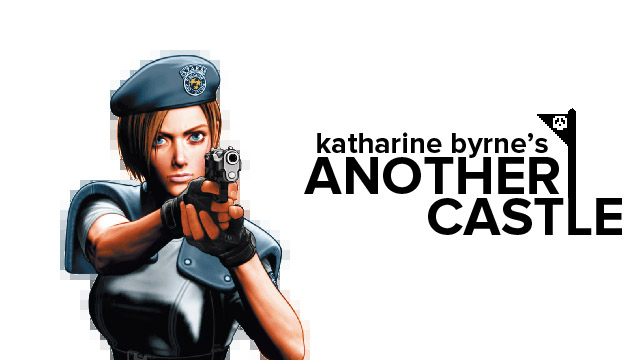 While I was at university, I had the chance (or misfortune, as I thought at the time) to study a text in another language. I say chance, but the truth is that every student had to pick a foreign language text right at the beginning of their degree. Having not studied French, German or Spanish for several years and not fancying my chances with post-modern French novels, Goethe or Lorca, I decided to opt for Italian, a language I knew next to nothing about except for a bit of holiday tourist vocab. We also had the option of learning Old Norse or Anglo-Saxon, but when I’ve never been very good at learning languages in the first place, I was determined to spend those three years learning a language that might actually be useful in the future.
While I was at university, I had the chance (or misfortune, as I thought at the time) to study a text in another language. I say chance, but the truth is that every student had to pick a foreign language text right at the beginning of their degree. Having not studied French, German or Spanish for several years and not fancying my chances with post-modern French novels, Goethe or Lorca, I decided to opt for Italian, a language I knew next to nothing about except for a bit of holiday tourist vocab. We also had the option of learning Old Norse or Anglo-Saxon, but when I’ve never been very good at learning languages in the first place, I was determined to spend those three years learning a language that might actually be useful in the future.
In the end it was probably just as useless as learning Old Norse or Anglo-Saxon because we only ever concentrated on being able to read Italian rather than actually speak or understand it in conversation. But one thing it did introduce me to was Dante and his Divine Comedy, and over the course of my final year I became very closely acquainted with Inferno, the first part of Dante’s epic poem. A little too close if you ask me, but just when I thought all my Inferno know-how was becoming just as useless as nearly everything else I’d learned at university, imagine my delight when I see quote after quote of it appearing in Resident Evil: Revelations!
Of course, Revelations doesn’t go citing the original Italian (that would be insane!), but anyone who’s played the game will know that the Divine Comedy is not only used as the motivation behind Veltro (itself a reference to the greyhound which appears in the first canto of Inferno), but that there are also three-line verses from Inferno marking the beginning of each chapter. These in particular are used to foreshadow the game’s upcoming events, but when Inferno is a rather lengthy poem with several tonnes worth of subtext hidden within its cantos, there’s only so much that three lines can realistically get across to the player when it comes to enhancing the game’s own narrative. So over the next couple of columns, I’m going to be taking a deeper look at what Resident Evil: Revelations is really getting at with these twelve short snippets of text (and boy are they getting at a lot!). Today I’ll be focusing on the first four chapters, so don’t abandon hope just yet, dear readers– your self-proclaimed Dante expert is here to help.
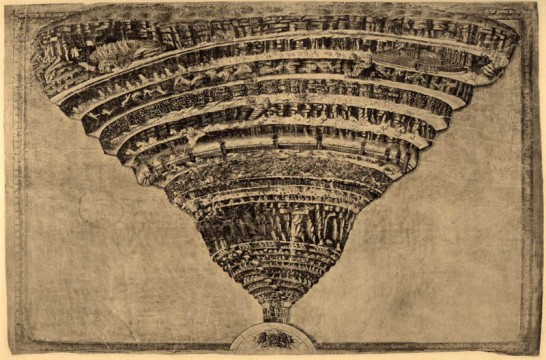
Chapter 1:
Through me the way is to the city dolent.
Through me the way is to eternal dole.
Through me the way among the people lost.
~Canto III
You know you’re in for one ominous introduction when you start off with the first three lines written on the gateway to Hell. The ninth and final line is the famous “Abandon all hope ye who enter here”, so it’s perhaps unsurprising that Revelations chose these three lines as its opening poetic gambit. Just as Dante is about to descend into the nine circles of Hell, so Jill and Parker are preparing to board the SS Queen Zenobia, a veritable hell-at-sea if ever there was one.
But what’s missing from this brief curtain-raiser is Virgil’s imminent explanation of the warning’s meaning. Only a few lines later he tells a perplexed Dante that he must surrender all his doubts and kill every shred of cowardice left in him because they’ve arrived at a place where Dante will see suffering souls who have lost all their intelligence and humanity. But Dante can’t abate his fears so easily, as the next thing he describes are all the moans, sighs and sobs he can hear coming from deep within the earth. He’s so frightened that Dante himself begins to weep, and for a moment he’s one of them, suffering from the sheer noise of what’s to come.
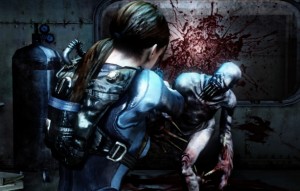 It reinforces that this isn’t going to be an easy journey, that Dante will have to overcome a lot more than he’s perhaps prepared for, both physically and psychologically, and it’s certainly going to be a lot harder than acknowledging a few words off a sign. But while the three lines above don’t quite capture the same sense of dread or anticipation implied by the rest of Canto III, the game’s sound design certainly does. If the sudden toll of Queen Zenobia’s bell wasn’t enough to get your pulse racing, the rattling ventilation shafts and the constant squelch of Jill’s wetsuit definitely will. There may be a few cheap thrills here and there, but when you can’t quite tell whether that slithering scrunch is a hidden ooze or your own wetsuit, you’ve got the rest of the Canto playing right out in front of you.
It reinforces that this isn’t going to be an easy journey, that Dante will have to overcome a lot more than he’s perhaps prepared for, both physically and psychologically, and it’s certainly going to be a lot harder than acknowledging a few words off a sign. But while the three lines above don’t quite capture the same sense of dread or anticipation implied by the rest of Canto III, the game’s sound design certainly does. If the sudden toll of Queen Zenobia’s bell wasn’t enough to get your pulse racing, the rattling ventilation shafts and the constant squelch of Jill’s wetsuit definitely will. There may be a few cheap thrills here and there, but when you can’t quite tell whether that slithering scrunch is a hidden ooze or your own wetsuit, you’ve got the rest of the Canto playing right out in front of you.
These three lines also foreshadow a number of the game’s key themes and events. The “city dolent” could be a reference to the Queen Zenobia itself, but it’s more likely alluding to the destruction of the floating city of Terragrigia and the subsequent “Terragrigia Panic”. This creates a rather interesting parallel between Terragrigia and the City of Dis in Canto IX, but I’ll save that analysis for later in the series. Likewise, the very reason why Jill and Parker have arrived on the Queen Zenobia is because they’ve effectively “lost” Chris Redfield and his partner Jessica, but we also come across several other “lost” passengers along the way, most of whom have succumbed to the nightmarish t-Abyss virus. And let’s not forget the inevitable pain dealt out by the ooze lurking in the Queen Zenobia’s depths either (some of which in fact take their official names from Inferno‘s own hoard of demons in the Malebranche).
So while they may not seem like much at first, those three lines are packed full of loaded references and hints about what’s to come. How they’ll all play out, however, is another question entirely.
Chapter 2:
Through every city shall Veltro hunt her,
Until he hath driven her back to Hell,
There from whence Envy first released her.
~ Canto I
Now this is a slight mistranslation because the word “veltro” doesn’t actually appear in the original verse here. It only appears once eight lines earlier, and the original line simply reads (roughly) as, “He shall hunt her through every city”. But the effect is essentially the same: “veltro”, the greyhound, is one of several beasts which appear in the first canto, and the “she” is a wolf blocking Dante’s path as he stumbles through the dark forest at the very beginning of his journey. She’s the third creature to pursue Dante, the others being a leopard and a lion, and Virgil describes her as a creature whose nature is so cruel and vicious that she can never sate her voracious will. She’s lusty, carnal, and is never satisfied no matter how much she gorges herself on food or sex. The only one who can chase her back to hell is the greyhound, a creature who thrives on wisdom, virtue and love, and he will be the one to lift Italy out of sin and restore the country to its former glory.
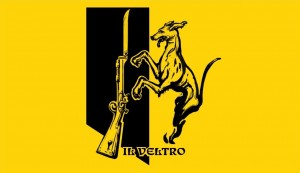 Read what you will into that, but the religious imagery is quite plain to see. By choosing Veltro as their moniker, Revelations‘s resurrected terrorist organisation are pitching themselves as a kind of heavenly saviour who will purify the world and crush the malignant avarice of human existence. Throw in the fact that they’ve also supposed to come back from the dead and you’ve got yourself a ready-made Christ-like allegory.
Read what you will into that, but the religious imagery is quite plain to see. By choosing Veltro as their moniker, Revelations‘s resurrected terrorist organisation are pitching themselves as a kind of heavenly saviour who will purify the world and crush the malignant avarice of human existence. Throw in the fact that they’ve also supposed to come back from the dead and you’ve got yourself a ready-made Christ-like allegory.
Yet it’s interesting to note that Veltro’s leader, Jack Norman, describes the group as being “vengeful messengers from the depths of the Inferno”, suggesting they’re either being deliberately ironic or someone’s been a bit lax in their Inferno homework. By straying from the greyhound’s more god-like qualities, they’re actually portraying themselves as the very creature they’re supposed to eradicate, and this rather undermines their supposedly noble goal of ridding the earth of its sinful and decadent ways.
But there’s something even more subtle going on during the first part of Chapter 2, as the only enemies Chris and Jessica encounter in the mountains are, in fact, fenrir wolves. At first this pits them as a kind of Dantean duo– they’re alone in the wilderness and these rabid canines are stalking their every move, especially when Chris injures his leg and has to survive an intense wolf attack while Jessica and her “sweet ass” come to the rescue. The only difference is that they’re both packing shotguns to help clear their path and move forward. By possessing the means to send the infected wolves back to the hell from whence they came, they’re almost more like the greyhound than Veltro themselves, playing both sides of the “one man’s hero is another man’s terrorist” divide rather slyly. But (spoilers ahead) considering that Veltro’s resurrection is a complete fabrication by O’Brian to expose Landsale’s treachery, perhaps this was O’Brian’s intention all along. Moreover, with Chris and Jill going on to crush both Lansdale and Jack Norman in the final chapters of the game, it’s a pretty crafty piece of symbolic foreshadowing.
Chapter 3:
Be silent thou accursed wolf;
Consume within thyself with thine own rage.
Not causeless is this journey to the abyss.
~ Canto VII
Speaking of wolves, this “lupo” isn’t the same one as before. Meet Plutus, guardian of the fourth circle of hell. Despite taking his name from Pluto (aka: Hades), Dante’s Plutus is equal parts man and equal parts monster, a creature who possesses the power of speech but whose words are lost in his bestial rage. As Plutus begins his raving, Virgil comforts Dante and tells him not to be afraid. Then, with all the authority he can muster, Virgil tells Plutus to, essentially, put a sock in it and let Dante pass. It’s Dante’s divine right, after all, to see this journey through, and Plutus promptly falls to the ground in submission.
Dante and Virgil then descend into the fourth circle of hell where the greedy and the spendthrifts reside (the wolf is also symbolic of avarice and corruption), and he describes how he sees so many “new” forms of travesty. Of course, this is the chapter which sends us back to Terragrigia, introducing us to new B.O.Ws, this time in the form of a new Hunter, a new setting and group of characters to control. But it also serves to remind players why we’re here in the first place. By going back to Terragrigia, it gives the game its cause, and the ensuing events sow the seeds of the game’s later betrayals and revelations.
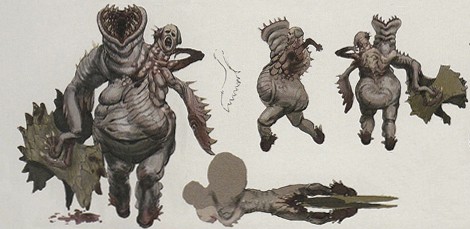
That’s one ugly mug you’ve got there, Plutus– I mean Scagdead.
It’s also the chapter in which Jill and Parker encounter Scagdead, the comms officer turned ooze monstrosity, and in a clever twist of internal series mythology, it just happens to share some quite stark similarities with Resident Evil: Dead Aim‘s very own Pluto B.O.W. If that wasn’t enough of an allusion to Plutus, Scagdead’s also got the half-human, half-monster vibe down to a tee, swinging its buzzsaw appendage in a wild frenzy while mindlessly screeching “Mayday! Mayday!” as it stumbles around like a listing ship. Unfortunately for Jill though, a couple of harsh words won’t calm this raging beast. Thankfully there’s a few exploding gas cylinders nearby to do the harsh talking for us, but when Scagdead falls to its knees and cries, “Stop it! I’m human!”, it creates a much stronger sense of conflict between its two natures. We never really empathise with Dante’s Plutus, but with Scagdead we’re almost forced to falter for a few brief seconds as we wonder whether he’s really still alive in there. But just as Dante proceeds to be utterly merciless in his condemnation of the greedy (at least compared to his relatively sympathetic treatment of the lustful in the second circle), we too must be sure in our aim and pull the trigger regardless of the pity that may be bubbling away inside us. After all, he doesn’t stay on his knees for long, and he’ll slice us in two if we’re not careful!
Chapter 4:
Solve for me that knot,
Which has entangled my conceptions here.
It seems you can see, if I hear rightly,
Beforehand whatsoe’er time brings with it.
~ Canto X
In Canto X, Dante comes face to face with a man called Farinata, the leader of the Ghibelline political party who killed Dante’s grandfather (a Guelph). The Ghibellines supported the imperial Holy Roman Emperor, while the Guelphs supported the Pope, and the two parties had a long and bloody history, eventually culminating in the Ghibelline’s defeat in 1289. But despite their political differences, Dante has a relatively pleasant and peaceful conversation with Farinata, and it’s Dante who voices the above quotation. Farinata tells him that all heretics like himself possess a supernatural ability to see events in the distant future– something called hyperopia. However, their foresight comes with a caveat: as an event draws closer to the present day, the more cloudy their vision becomes, and once Judgement Day arrives, they won’t be able to see or sense anything but their own eternal suffering.
In Revelations we see a similar clash of opinion between Parker and Raymond, once team-mates but now on either side of the BSAA and FBC divide. They begrudgingly cooperate out of necessity to restore the ship’s power, but it’s Raymond’s missing partner Rachael who’s the real point of concern here. As Jill looks for the missing lift key, her search leads her right back to where she saw the poor woman being devoured by two oozes only a few chapters earlier. Back then Jill assumed she had died in the attack, but when a strange voice coos a sinister “Found you”, we realise Jill should have known better.
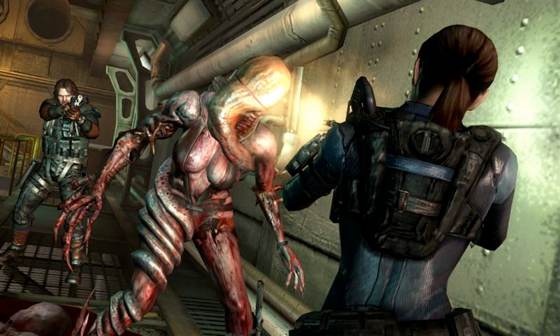
This plays on another encounter Dante has just moments after he meets Farinata, this time with a man named Cavalcante. He’s the father of Dante’s best friend, Guido, and when he asks about the well-being of his son, a slight grammatical slip in Dante’s speech (“he had” rather than “he has”) makes him convinced that Guido must have died. Dante’s rather bewildered by this response as he knows Guido’s very much alive at the time of his journey, but Cavalcante disappears before Dante can correct himself.
This creates an interesting parallel between Jill and the player, but more important are the deeper questions it asks about our expectations of the survival-horror genre as a whole. Just as Farinata can see into the distant future, several of us probably saw Rachael’s inevitable return a mile off. The genre dictates that we’re in for a scare somewhere along the line– we just don’t know when. No matter how much we try and brace ourselves, nine times out of ten we’re still caught off guard, and Rachael’s comeback plays directly into this. We know she’ll be back, but the more progress we make and the more we get distracted by chasing other goals, the more uncertain we become about when it’s going to happen. Then before we can yell “Jill sandwich!” she’s suddenly racing towards us, soaking up clip after clip of bullets, and each subsequent encounter is more unexpected than the last as we chase her through the ship. Thankfully we live to see another day, but just as Virgil tells Dante to remember well what he’s seen and heard here, we too can be a little bit more prepared the next time something crawls out of the air vents.
I told you those quotes were getting at a lot of stuff, didn’t I? Well, this master of unlocking is only just getting started. The Dante rabbit hole goes much, much deeper than these couple of quotes, so tune in next time for Part II where I’ll be looking at Chapters 5 to 8. Until then!




 ShareThis
ShareThis






